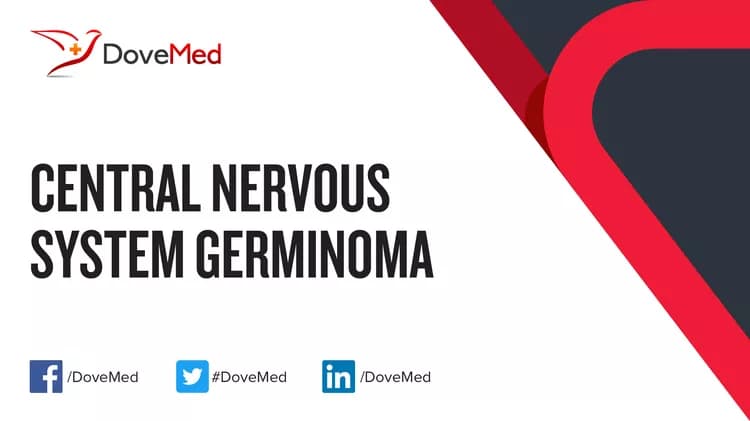What are the other Names for this Condition? (Also known as/Synonyms)
- CNS Germinoma
- Germinoma of the Central Nervous System
- Intracranial Germinoma
What is Central Nervous System Germinoma? (Definition/Background Information)
- Central Nervous System Germinoma are germ cell tumors occurring predominantly in pediatric patients. This is the most common type of pineal region tumors, and affects males at a higher frequency than females
- Approximately, 80-90% of Central Nervous System Germinoma occurs in the pineal gland (in the brain). Central Nervous System Germinoma can also occur as suprasellar masses, although these are less frequent
- Symptoms of CNS Germinoma depend on the site of tumor formation, and may include headaches, vision problems (inability to move eyes up/down), hydrocephalus (fluid accumulation in the brain) and diabetes insipidus
- The tumor is generally treated with radiation and/or chemotherapy. The prognosis of Central Nervous System Germinoma is good, with 90% of those affected surviving for a period of 5 years or over
Who gets Central Nervous System Germinoma? (Age and Sex Distribution)
- Central Nervous System Germinoma is a rare disorder. In most cases, the presentation of symptoms occurs in late childhood, with about 90% cases being under the age of 20
- Both males and females may be affected. However, the most common type (pineal region germinoma) occurs more frequently in males than females (approximately, in a 5:1 ratio)
- Worldwide, individuals of all racial and ethnic groups may be affected
What are the Risk Factors for Central Nervous System Germinoma? (Predisposing Factors)
- Currently, no risk factors have been clearly identified for Central Nervous System Germinoma
It is important to note that having a risk factor does not mean that one will get the condition. A risk factor increases one’s chances of getting a condition compared to an individual without the risk factors. Some risk factors are more important than others.
Also, not having a risk factor does not mean that an individual will not get the condition. It is always important to discuss the effect of risk factors with your healthcare provider.
What are the Causes of Central Nervous System Germinoma? (Etiology)
- The exact underlying cause of Central Nervous System Germinoma is currently unknown
- It is believed that the tumors may arise either from migration of germ cells or transformation of existing germ cells
What are the Signs and Symptoms of Central Nervous System Germinoma?
The signs and symptoms of Central Nervous System Germinoma depend on the site of tumor formation, and may vary between affected individuals. The signs and symptoms may include:
- Hydrocephalus (fluid accumulation in brain’s cavities), causing the following:
- Lethargy, sleepiness, drowsiness
- Irritability, headaches
- Blurred vision, swollen optic nerve, ‘sunsetting’ of the eyes
- Vomiting and nausea
- Unsteady walking posture, loss of balance
- Dementia, memory loss, cognition and coordination problems, speech impairment
- Seizures
- Urinary incontinence
- Vision problems (inability to move eyes up/down)
- Diabetes insipidus leading to the following:
- Dry mouth
- Loss of skin pressure (turgor pressure)
- Sunken eyes
- Frequent urination
- Loss of energy and tiredness
- Mood changes
- Muscle cramps and pain
- Loss of appetite
- Decrease in body weight
- Tachycardia: Increased heart rate in response to lowering of blood pressure due to fluid losses
How is Central Nervous System Germinoma Diagnosed?
Central Nervous System Germinoma is diagnosed on the basis of the following information:
- Complete physical examination
- Thorough medical history evaluation
- Assessment of signs and symptoms
- Laboratory tests
- Imaging studies
- Biopsy studies, if necessary
Many clinical conditions may have similar signs and symptoms. Your healthcare provider may perform additional tests to rule out other clinical conditions to arrive at a definitive diagnosis.
What are the possible Complications of Central Nervous System Germinoma?
The complications of Central Nervous System Germinoma may include:
- Hypernatremia, or increased blood sodium due to fluid loss in urination
- Fainting spells, due to excessive dehydration
- Premature puberty
- Delayed puberty
- Mood changes leading to behavioral changes
- Spinal cord metastasis of the tumor
- Metastasis due to displacement of tumor tissue during surgery
Complications may occur with or without treatment, and in some cases, due to treatment also.
How is Central Nervous System Germinoma Treated?
The treatment for Central Nervous System Germinoma may involve:
- Radiation therapy
- Chemotherapy
- A combination of radiation and chemotherapy, if necessary
How can Central Nervous System Germinoma be Prevented?
- Central Nervous System Germinoma may not be preventable, since it is a germ cell disorder
- Active research is currently being performed to explore the possibilities for treatment and prevention disorders such as CNS Germinoma
- Regular medical screening at periodic intervals with tests and physical examinations are recommended
What is the Prognosis of Central Nervous System Germinoma? (Outcomes/Resolutions)
- The prognosis of Central Nervous System Germinoma is good, if diagnosed early and treated promptly
- With treatment, about 90% of affected individuals live at least 5 years post-diagnosis
- Typically, the prognosis may be assessed on a case-by-case basis
Additional and Relevant Useful Information for Central Nervous System Germinoma:
The following DoveMed website links are useful resources for additional information:
http://www.dovemed.com/diseases-conditions/rare-disorders/
http://www.dovemed.com/diseases-conditions/congenital-hydrocephalus/
http://www.dovemed.com/diseases-conditions/nephrogenic-diabetes-insipidus/
Related Articles
Test Your Knowledge
Asked by users
Related Centers
Related Specialties
Related Physicians
Related Procedures
Related Resources
Join DoveHubs
and connect with fellow professionals


0 Comments
Please log in to post a comment.